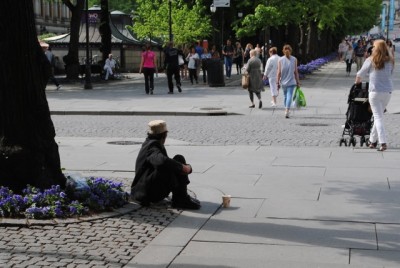Controversial plans to give individual municipalities the power to ban begging could be underway by summer, if the government secures a majority vote in parliament. A new survey showed widespread public support for the bans, but others argued it was wrong to prohibit asking for help, and it could actually drive up crime.

Last month the Conservative (Høyre) and Progress Party (Fremskrittspartiet, FrP) coalition proposed changes to the Police Act to allow municipalities to ban begging, in order to “prevent crime, ensure peace and order, and secure residents’ everyday needs for security.” The laws state they’re to be applied equally to both ethnic Norwegian and foreign beggars. Oslo in particular receives an influx of migrant poor each summer, mostly of Roma origin.
Over the weekend, newspaper Aftenposten released the results of its survey into public support for the changes. Two out of three people said they wanted begging banned in their community. There was marginally more support for a ban from respondents in the Oslo and Akershus region than in the rest of Norway.
“I’m working for this to be passed quickly, so that the municipalities should be able to do this already this summer,” said Justice Minister Anders Anundsen. “If we get a majority in Parliament for this, we are planning to establish a standard procedure for rapid change of the police regulations.”
“All beggars are not criminals,” said Conservative justice spokesman Anders Werp. “Probably and hopefully very few are. But the police are signalling that follow-on crime comes with this, and that is the starting point for Høyre‘s stance in the case. We must handle the human side with other tools.”
Must pass parliament
Last year Parliament rejected a national ban on begging. The former Stoltenberg government settled for restrictions instead. The new proposal includes removing current rules which require municipalities that restrict or limit begging to arrange basic assistance for beggars.
To pass the laws giving broader powers to municipalities, the new conservative coalition needs the Centre Party’s (Senterpartiet, Sp) support. Its cooperating parties, the Christian Democrats (Kristelig Folkeparti, KrF) and the Liberals (Venstre) strongly oppose the ban, as do the Socialist Left (Sosialistisk Venstreparti, SV), Labour (Arbeiderpartiet, Ap) and Greens (Miljøpartiet De Grønne) parties.
KrF‘s justice spokesman Kjell Ingolf Ropstad said while nobody likes to have beggars in the street, it’s fundamentally wrong to ban the practice. “The proposal involves punishing the weak party,” he argued. “The question is what these people will do as an alternative. The consequence is they will quickly have no money at all, and I am afraid that will lead to more crime.”
Anundsen said it was not a law targeting the weakest and poorest, because the face of begging in Norway had changed. “In many cases it’s well organized groups which use it as a kind of profession,” he said. “There is also more aggressive begging now than before. These are factors which make it important to have the possibility to introduce a begging ban. It is also an important signal to those who come to Norway in the summer to beg, that they shouldn’t continue with this.”
Calls for a national ban
The Centre Party’s justice spokeswoman, Jenny Klinge, told Aftenposten the proposal didn’t go far enough. “What I think is a shame is that FrP and Høyre, with the opportunity to change the law so that begging is banned in the whole country, they didn’t use that opportunity,” she said. Klinge believed a national ban would be the most organized, effective approach. “It would be easy to apply to all – not least those who come here to beg. Then people will neither be tempted to force others to beg here.”
The Mayor of Drammen, Tore Opdal Hansen also wanted a national ban on the grounds many older citizens particularly feel threatened by beggars. The city has tried to introduce bans on several occasions, but was only allowed to register beggars under the scope of current legislation.
Anundsen said the municipal ban was chosen because there’s a good chance of getting it through Parliament, and it could be expanded upon later. “The more municipalities that adopt this, the more effective it will be,” he said. “There is a varying extent to which it occurs in the different municipalities, so there can be different needs. We must see if the effect is that it gets rid of the problem, or if it just moves the problem around.”
Punishing people who need help
Lawyer Frode Sulland heads the Norwegian Bar Association (Advokatforeningens) defender group. He said despite the response to the Aftenposten poll, it was not the role of politicians to run after public opinion. “We can not use punishment against something we just do not like,” he said. “Begging is not harmful in any way. People would prefer not to see society’s underbelly.”
The association’s official position is that it’s a basic right to ask for help, without being subject to regulation. “The Bar Association, as a starting point, finds it difficult to see that such a request for financial help from one person to another shall be such an unwanted and harmful social behaviour that it must be covered by criminal or other laws,” it wrote.
Sulland said police can already intervene in the case of crimes associated with begging, including littering and illegal lodging.
Municipalities including Bergen and Stavanger said they do not need a ban, because a registration and reporting system with the police has been effective. Trondheim has regulated intrusive and aggressive begging, but is opposed to a “forbid away the poor” policy. Oslo’s position is not yet clear.
The new proposal follows the unanimous repeal of Norway’s earlier ban on begging in 2005. It will not cover buskers, people selling wares, or collections by charities or non-profit groups.
newsinenglish.no/Emily Woodgate

